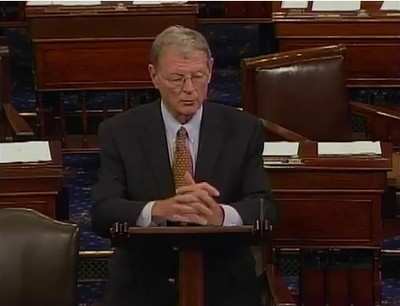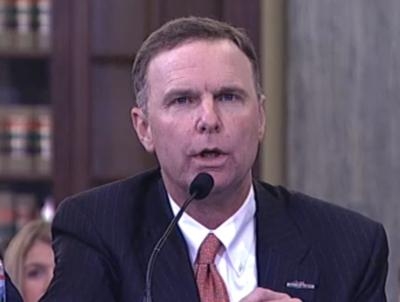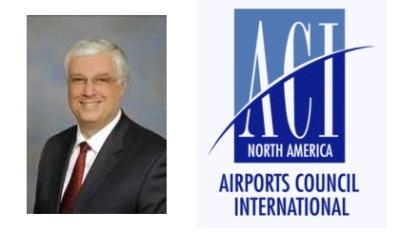Inhofe Calls Passage A 'Big Victory' For GA Pilots
The full United States Senate passed the Pilot's Bill of Rights 2 (PBOR2) on a unanimous vote Tuesday night. The bill, sponsored by Senator James Inhofe (R-OK) bill had 70 cosponsors from both sides of the aisle.

“This is a big victory for general aviation pilots all across the country,” said Inhofe (pictured). “The Pilot’s Bill of Rights 2 addresses many of the concerns these pilots have brought to my attention first hand at events like Airventure each year held in Oshkosh, Wisconsin since the first Pilot’s Bill of Rights was signed into law in 2012. Currently, the FAA’s medical certification process is bureaucratic, burdensome and discourages pilots from disclosing and treating medical conditions that could impact their ability to fly. This legislation reforms the medical certification process for general aviation pilots in a way that will increase pilots’ knowledge of risk while demanding treatment of identified conditions. This bill also increases due process protections for pilots, ensuring the FAA treats them in a fair and equitable manner. I appreciate Senator Manchin, Chairman Thune and Ranking Member Nelson for working with me on this
legislation, and I am pleased the Senate has passed this important bill.”
“General Aviation is losing 6,000 pilots per year because of antiquated regulations and unnecessary bureaucratic barriers,” said Manchin. “This industry contributes $219 billion to the U.S. economy each year and supports 1.1 million jobs. I am proud to have helped lead this effort with Senator Inhofe to finish what we started in 2012.”
Passage of the bill was widely praised across the industry.
“We are very pleased to see the Pilot’s Bill of Rights 2 moving forward,” said Mark Baker, president of the Aircraft Owners and Pilots Association. “These reforms will improve safety, foster the private pilot - private physician relationship, and give general aviation pilots much-needed relief from the current cumbersome, outdated, and costly federal medical process. Sen. Inhofe has been a real leader for general aviation in the United States Senate and we appreciate him and others who have worked so hard on this legislation.”
“This is very important legislation for all Americans who fly recreationally and pursue the freedom of flight,” said Jack J. Pelton, chairman and CEO of the Experimental Aircraft Association. “Our thanks to Sen. Inhofe, Sen. Manchin and the co-sponsors who understood the importance of this measure and worked hard for its passage, so we can reduce the unnecessary cost and regulatory burdens within the current aviation medical certification system.”

“NBAA commends the United States Senate for passage of the Pilot's Bill of Rights 2,” said Ed Bolen (pictured), president and CEO of the National Business Aviation Association. “We especially want to recognize Sen. Inhofe's leadership in introducing the bill and working with the 70 senate co-sponsors to achieve this important legislative victory for the general aviation community. We are pleased that this bill provides needed reforms for third class medicals and expands the due process rights of airmen.”
“NATA commends the tireless efforts of Sens. Inhofe and Manchin to move the Pilot's Bill of Right 2 through the Senate,” said Tom Hendricks, president and CEO of the National Air Transportation Association. “We appreciate their ongoing work to preserve and enhance general aviation in this nation. NATA looks forward to working with other general aviation stakeholders towards the legislation’s swift approval in the House.”
“We appreciate Sen. Inhofe's steadfast support of our nation's professional pilots,” said Capt. Keith Wilson, president of Allied Pilots Association. “This bill would provide needed balance in administrative proceedings and other venues in which a pilot's career may be jeopardized by certificate denial, suspension or revocation.”
“The pilots of Southwest Airlines welcome the passage of S. 571 and truly appreciate Sens. Inhofe and Manchin’s dedication to pilots and the piloting profession,” said Captain Mike Panebianco, vice president of the Southwest Airlines Pilots Association. “The Pilot's Bill of Rights 2 provides long overdue protections and ensures fair treatment of pilots facing administrative proceedings. Additionally, the changes to the third class medical encourages growth of the U.S. general aviation community and allows the FAA to focus its resources on maintaining its world-class oversight of the commercial aviation industry. This bill is just one more example of Sen. Inhofe’s thoughtful pragmatism and highlights the importance of having members that truly understand aviation.”
“By spearheading S. 571, the Pilot's Bill of Rights 2, Sens. James Inhofe and Joe Manchin have reaffirmed a tireless commitment to defending and enhancing the interests of professional and general aviation pilots,” said Capt. Coley George, Industry Affairs committee chair of NetJets Association of Shared Aircraft Pilots. “On behalf of the NJASAP Membership, it is my privilege to recognize and to express our gratitude for their enduring commitment to addressing the concerns of all pilots from hobbyist to professional cockpit crewmember.”

“NASAO commends Sens. Inhofe and Manchin, and their staffs, for their tireless work to gain Senate passage of this vital reform,” said Greg Principato, president and CEO of the National Association of State Aviation Officials. “This common sense medical reform will help stem the decline of the general aviation pilot population by keeping pilots in the air—without degrading safety. This legislation will not only benefit the pilots, but also the vast network of smaller general aviation airports that they support.”
PBOR 2 reforms the FAA’s overly burdensome medical certification process by expanding an existing FAA medical standard to include more qualified, trained, general aviation pilots. It also:
- Outlines specific requirements that pilots need to meet to qualify for the expanded medical standard, including completion of a medical education course every two years, self-certification by the pilot that they are being treated by their physician for any medical diagnosis that could impact their ability to fly, and the use of a checklist to guide the discussion between pilots and their physicians during a health examination, which must occur once every four years.
- Enhances the due process rights established in the first Pilot’s Bill of Rights by ensuring airmen have the right to appeal an FAA decision through a new, merit-based trial in Federal Court.
- Increases transparency for airman subject to an investigation or enforcement action by requiring the FAA to articulate the specific activity under investigation to parties involved in the investigation and provides specific documentation relevant to its investigation.
- Expedites updates to the Notice to Airmen (NOTAM) Improvement Program required in the first Pilot’s Bill of Rights and directs the FAA to include the effective duration of temporary flight restrictions in NOTAMs. This ensures the most relevant and important information reaches the pilot prior to a flight taking place. The legislation also mandates that the FAA certify the accuracy of posted NOTAMs.
- Ensures the accessibility of flight data, such as air traffic communication tapes and radar information produced by contract towers, and flight service stations and controller training programs, which gives certificate holders the ability to use this information to defend themselves during an enforcement action proceeding.
A companion bill must pass the U.S. House and be signed by President Obama before PBOR 2 can become law.
(Source: News release from Senator Inhofe. Images from file)
 ANN's Daily Aero-Term (04.24.24): Runway Lead-in Light System
ANN's Daily Aero-Term (04.24.24): Runway Lead-in Light System ANN's Daily Aero-Linx (04.24.24)
ANN's Daily Aero-Linx (04.24.24) Aero-FAQ: Dave Juwel's Aviation Marketing Stories -- ITBOA BNITBOB
Aero-FAQ: Dave Juwel's Aviation Marketing Stories -- ITBOA BNITBOB Classic Aero-TV: Best Seat in The House -- 'Inside' The AeroShell Aerobatic Team
Classic Aero-TV: Best Seat in The House -- 'Inside' The AeroShell Aerobatic Team Airborne Affordable Flyers 04.18.24: CarbonCub UL, Fisher, Affordable Flyer Expo
Airborne Affordable Flyers 04.18.24: CarbonCub UL, Fisher, Affordable Flyer Expo





